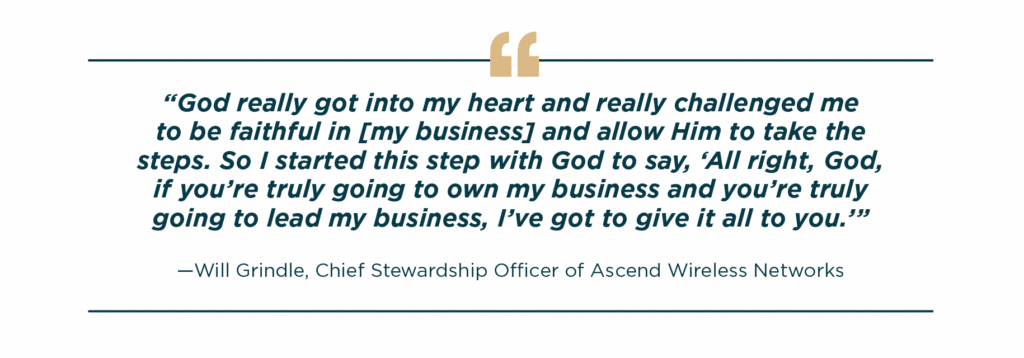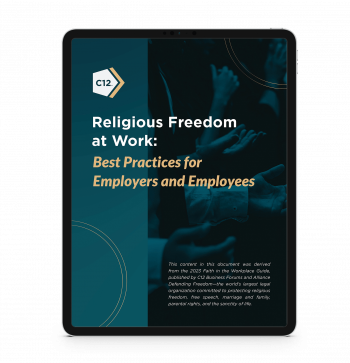Answering Your Questions on Expressing Faith in Your Business
Guidelines for Faith in Business Integration
As a Christian, you want your life to reflect your love for God in all that you do. As a business leader, “all that you do” includes expressing your faith in your business. As we say in C12, “God has an eternal plan for each believer’s life, and that plan includes their business.”
However, employers are often confused about what is and is not permissible regarding faith expression in business. Some Christian employers operate with reckless boldness, expressing their faith in ways that may not be allowable under the U.S. Equal Employment Opportunity Commission (EEOC) regulations. Other Christian employers operate in fear and ignorance, overestimating the risks associated with proclaiming allegiance to Christ and choosing to remain silent. Ironically, excessive concealment, covert agendas, and inconsistent expressions of faith also create risks for your business (James 2:14–26). There are ditches on both sides of the narrow path (Matthew 7:13–14).

Here is the truth: you have great freedom to express your faith in your business. However, there are guidelines for faith in business integration that should be followed. With an informed and biblical perspective, you can resist fear and passivity, integrate your faith and work confidently, and experience the joy of eternal impact in and through your business.
This article was created to answer questions about expressing your faith in your business. Our hope is that this resource equips you to build a business in a way that honors God and advances the gospel in the marketplace. As a leader, implementing faith in your business begins with you. Taking the first steps toward faith and work integration can be daunting. To help you move forward with clarity, we have addressed some common questions regarding the guidelines for faith in business:
What Is “Business as a Ministry”?
You may have heard the phrase “Business as a Ministry,” but what exactly is it? Business as a Ministry (BaaM) refers to C12’s Christian leadership paradigm in which a CEO or business owner integrates a mission to love God and love others with the company’s operations for an eternally balanced scorecard. Embracing the reality that God cares about what you do (in business), why you do it, how you do it, and who you become in the process is part of an integrated life in Christ.
Your business belongs to God—He is the true Owner. He entrusts it to you to be used for His glory and as a platform for His message. It is common to think about business and ministry in different worlds, with your business funding ministry. At C12, we approach things with a powerful integration model of Business as a Ministry, believing the gospel changes why and how we do everything. It also realigns our formulas for success.
Like many others, Will Grindle, Chief Stewardship Officer of Ascend Wireless Networks, wanted to be more explicit about his faith expression in the business but was uncertain how to proceed. He decided to step out in faith, trusting God with where it would lead.

You may feel like Will, unsure of how to incorporate faith in your business but feeling convicted to do so. You are not alone in this journey. Many Christian business leaders share this desire, and C12 offers a community of like-minded peers and mentors who have taken this journey and are ready to support you.
Is It Okay to Have a Faith-Based Mission Statement and Core Values?
Yes, including your company’s faith-based commitment in your mission statement and your core values is absolutely okay. In fact, it is encouraged if you are operating your business with Christian values. For example, in the 2014 Burwell v. Hobby Lobby Stores case, the Supreme Court cited Hobby Lobby’s faith-based mission statement as a reason for ruling in their favor. Here are a handful of other for-profit businesses with faith-based mission statements:
“To glorify God and enrich lives as we deliver the most trustworthy source of power to the world.”
“We are committed to honoring the Lord in all we do by operating the company in a manner consistent with Biblical principles, offering our customers exceptional selection and value, serving our employees and their families by establishing a work environment and company policies that build character, strengthen individuals, and nurture families, and providing a return on the family’s investment, sharing the Lord’s blessings with our employees, and investing in our community.”
“To glorify God by being a faithful steward of all that is entrusted to us. To have a positive influence on all who come in contact with Chick-fil-A.”
Your mission statement is a succinct statement that expresses what the business does and why the business exists. It provides internal clarity to the organization and should be crafted as a genuine and unique expression of your business’s values and purpose.
Some C12 members have created onboarding videos explaining their faith-based mission statement and core values. This is permissible if they expressly affirm that all perspectives are welcome in the company. Additionally, C12 members have shared faith stories through emails or during company meetings. This is also acceptable, provided they explain the purpose and emphasize that reading or listening is voluntary.
How Do Faith-Based Mission Statements and Core Values Affect Personnel Decisions?
Just as secular employers screen for mission and cultural fit, faith-based employers can also seek to hire employees who can align with and affirm their core values. However, faith-based employers cannot make hiring decisions based on an applicant’s religious beliefs. Religious discrimination in the workplace is defined as treating a person (an applicant or employee) unfavorably because of their religious beliefs in any aspect of employment, including hiring, firing, pay, job assignments, promotions, layoffs, training, fringe benefits, and other terms or conditions of employment.
Your company’s values—not religion—should guide your personnel decisions. If your mission statement and core values align with biblical principles, it is best to be up-front about them in the interview process and ask candidates questions such as, “Would you be comfortable working in a culture like this one?”
Can You Host Bible Studies in Your Business?
Yes, employers can offer voluntary prayer meetings or Bible studies as long as employees of other faiths can start similar groups on the same terms. It is recommended that the employer provide written notice of the prayer meeting or Bible study, stating that it is voluntary and that participation or non-participation will not be used as a factor in employment decisions. Hosting the studies outside of working hours reinforces their voluntary nature.
Bible studies are a great way to foster community among your employees and provide a safe space for fellowship. This type of gathering may even open the hearts of your non-Christian employees. For more ideas on cultivating a BaaM culture within your business, download our free resource, 105 BaaM (Business as a Ministry) Ideas.
Can You Donate Company Money and Employees’ Time to Faith-Based Non-Profits?
Donations: Yes, employers are free to choose which, if any, charities to fund and may match employee donations to these charities. However, faith-based employers would be wise to choose faith-based charities with broad appeal that contribute to the positive values-based culture they are working to build. Employees must never feel coerced to donate personally or to conform to a particular sect in the workplace.
Employee Volunteer Time: Yes, companies may also donate their employees’ time to faith-based charities or service projects, including volunteering several hours each month to enhance public relations with the community. As with donations, employers would be wise to choose charities with broad appeal. Additionally, employees must be allowed to decline volunteer opportunities without fear of negative repercussions.
Can You Share Your Faith in Your Business by Displaying Bible Verses, Playing Christian Music, Hiring a Chaplain, Giving Out Christian Materials, etc.?
Yes, Christian business leaders have great freedom to overtly express and share their faith with people who interact with their business. Data suggests that the workplace may be your greatest opportunity to have spiritual conversations with non-believers.

As a leader, you have been given a unique platform to interact with and influence a wide array of people: your employees, their families, your customers, suppliers, vendors, communities, and beyond. You can share your faith in your business, but it must be done thoughtfully and respectfully to be effective. Employees must feel safe and know that you are not trying to coerce them or that refusing your invitation would negatively impact their standing at work. There must be a genuine relationship of trust. If an employee disagrees with or protests with their employer’s religious beliefs, an employer cannot take any adverse action for their disagreement.
Public Displays of Faith in Decor, Music, and on the Company Website: If you own the business, you can decide what religious materials are displayed at work (e.g., Bibles, copies of The Purpose Driven Life, Christian music, Christian pictures/posters, etc.). Chick-fil-A and Interstate Batteries boldly proclaim their purposes on their websites as “to glorify God.”
Christian Materials: Including Bible verses on printed company materials and giving out evangelistic material is also permissible. The California-based chain In-N-Out Burger (27,000+ employees) has printed Bible verses on its cups and wrappers since the early 1990s. Additionally, The Pocket Testament League, a BaaM Resource Organization, enables you to create custom pocket-sized Gospels of John that can be given to business associates or included with orders to help you share God’s Word with others.
Chaplaincy: Many Christian employers enlist the services of corporate chaplains to extend faith-based care for their employees in a non-threatening manner. As long as using chaplain services is voluntary, employers are free to make chaplains available to employees. Ensure that all conversations between employees and chaplains remain confidential.
C12 has a list of BaaM Resource Organizations—trusted, vetted, and mission-aligned companies and ministries that help you share your faith with employers and customers. These include but are not limited to:
Remember, as a Christian leader, your job is to plant the seeds, trusting God to do the rest (1 Corinthians 3:6–7).
Can You Lead Group Prayers before Meetings and Company Meals?
Yes, you can lead group prayers during business hours as long as it is known that participation is voluntary. Group prayers before meetings or company meals can set a positive tone, especially if there is a clear connection to the company’s mission, vision, and values. Here are a few tips to ensure inclusivity and respect for prayer gatherings:
- Voluntary Participation: Make it clear that participation in prayer is voluntary.
- Advance Notice: Inform employees in advance when group prayers will occur, allowing them the choice to step away if they prefer.
- Off Hours: If you host a prayer meeting, have it before work, at a break, or after work. This emphasizes the voluntary nature of the meeting and lessens the chance of animosity between those who attend and those who choose not to attend.
- Prayer Requests: Consider allowing employees to submit prayer requests discreetly or publicly. Many people, even those who are not religious, appreciate the gesture of prayer from friends and co-workers during challenging times. Offering to pray for them can address their needs and show your care and support.
People rarely reject prayer in a time of need, which may create opportunities to share the gospel while ministering to them.
What Role Does the EEOC Have in Regulating Christian Liberty in the Workplace?
The EEOC, created by the Civil Rights Act of 1964, enforces federal civil rights laws in employment. In this video, EEOC Commissioner Andrea Lucas discusses the rights of religious employers and employees, encouraging you to live your faith boldly and prudently, with mutual respect for all.
What Regulations Does the US Government Put on Religious Employers?
The EEOC enforces laws that protect employees from religious discrimination in all aspects of employment. It is important to note that these laws do not restrict your ability to implement Christian values in your business. As discussed earlier, you can still say prayers, conduct Bible studies, and have a faith-based mission statement. The key is to ensure that you do not discriminate against anyone for not participating in faith-based activities or base employment decisions on an applicant’s or employee’s religious beliefs.
It is also important to note that there is a distinction between religious organizations and non-religious businesses. For example, a church can legally require its pastor to adhere to its religious beliefs, but non-religious businesses do not have the same freedom. As a Christian business leader, you must carefully navigate these guidelines for faith in business.
Your ability to exercise religion in the workplace is great, allowing Christian leaders the freedom to express their faith in their businesses in positive and appropriate ways and show genuine love to their employees and clients throughout their business operations.
Alliance Defending Freedom, a BaaM Resource Organization, “is one of the leading Christian law firms committed to protecting religious freedom, free speech, marriage and family, parental rights, and the sanctity of life.” ADF can assist in navigating the legal requirements for integrating faith and business and defending your company and employees. To learn more about your employer and employees’ rights, download the free resource Religious Freedom at Work: Best Practices for Employers and Employees.
For the Glory of God
You do not need to choose between your allegiance to Jesus and your desire to run a successful business. Thousands of leaders, including those in C12, have been able to integrate ministry into their businesses in ways that are both permissible and wise.
Leading a business is a powerful platform for redemptively engaging culture, promoting human flourishing, and testifying to the reality of Jesus Christ. Your business can become a discipleship dojo where you work out your faith with zeal and humility. But remember: right intentions do not excuse reckless execution, just as fear or ignorance does not justify denying your faith. May you accept God’s invitation to the narrow path, humbly following the guidelines for faith in business while courageously expressing your faith at work.
Disclaimer: This document contains general information, is not intended, and should not be relied upon as legal advice or analysis. You should seek appropriate legal advice from a licensed attorney for your situation.
C12 Business Forums provides an architected environment for Christian business leaders that integrates work, life, and leadership transformation. To learn more about C12’s approach to Christ-centered business leadership, find a C12 Business Forum near you.
July 24, 2024












